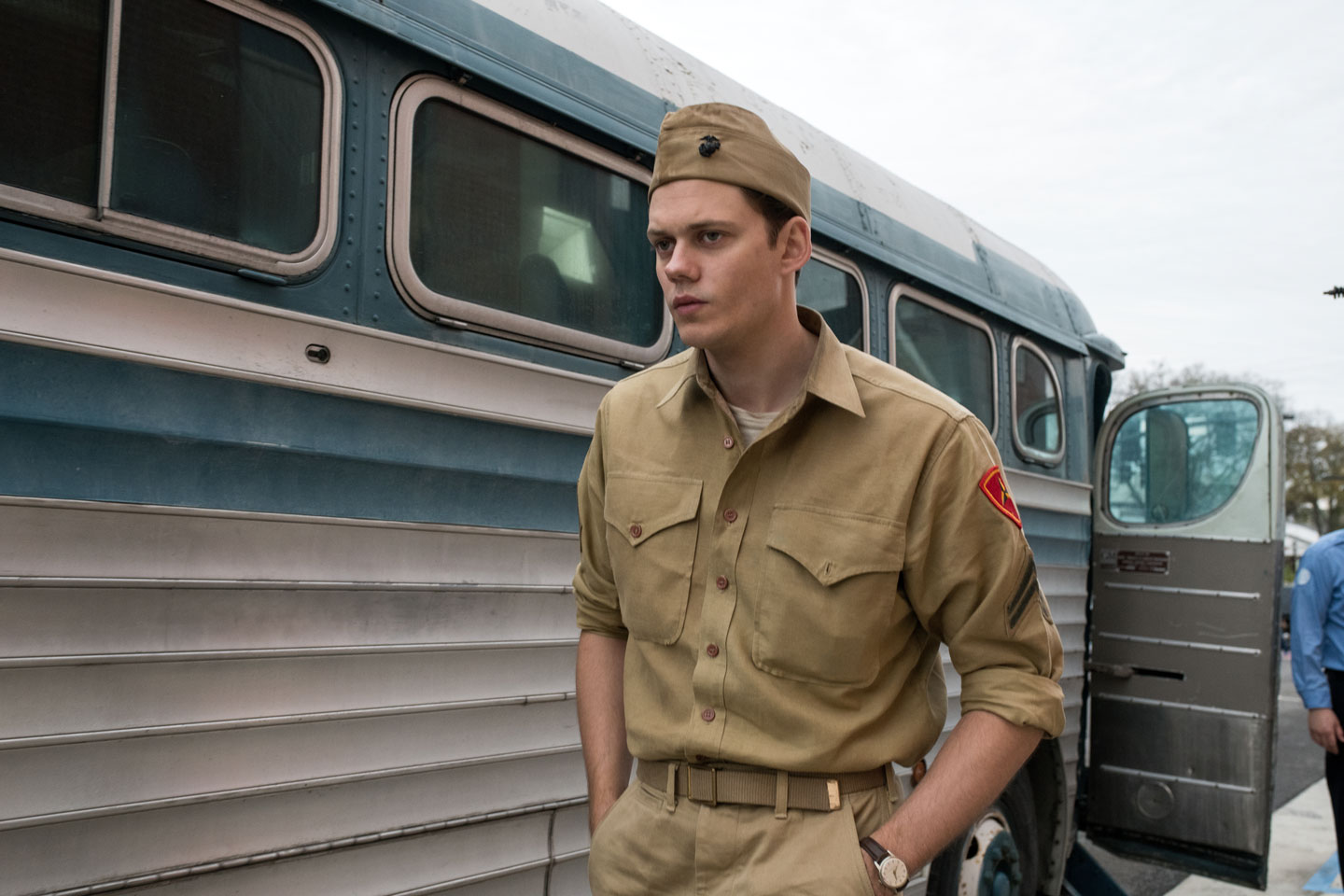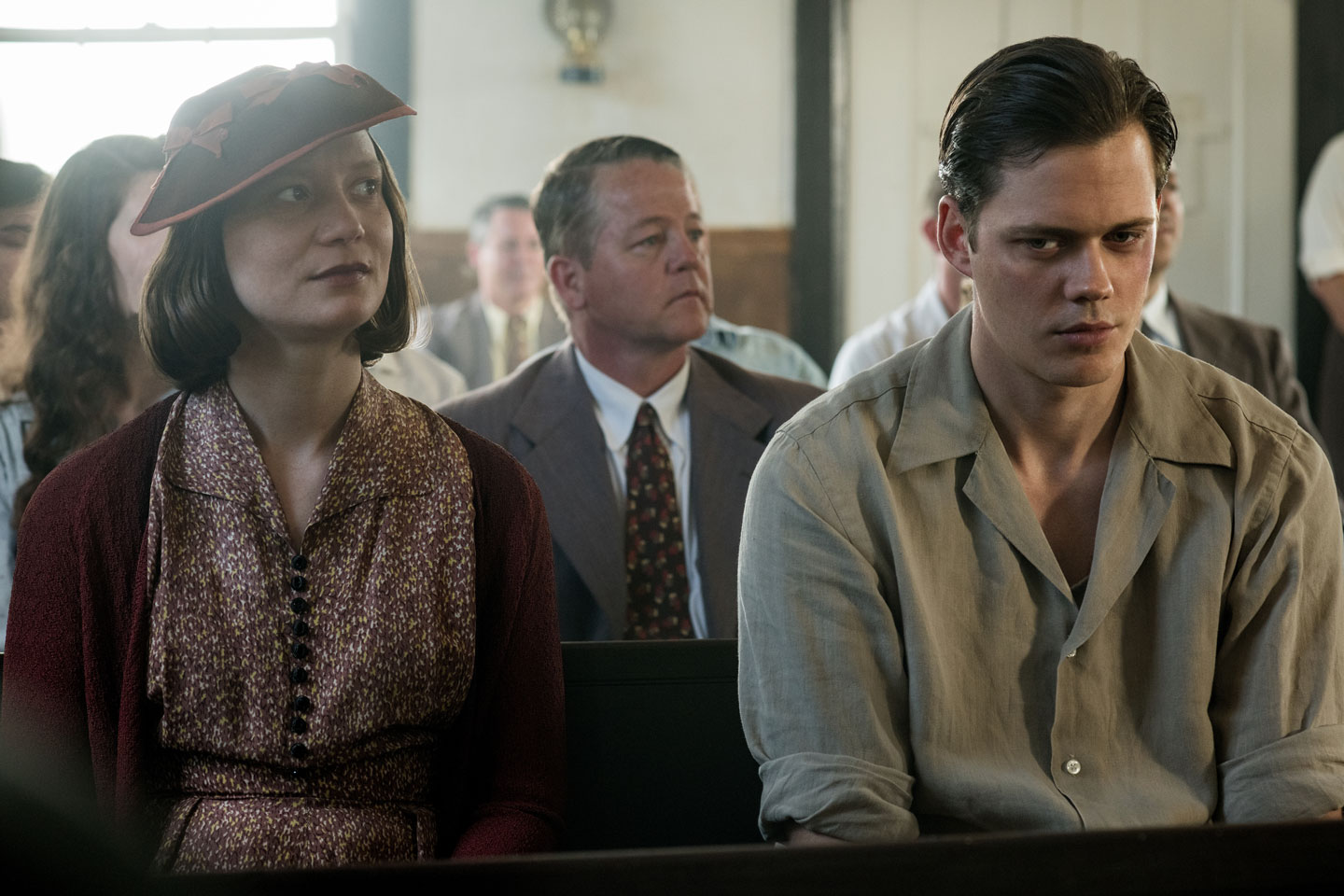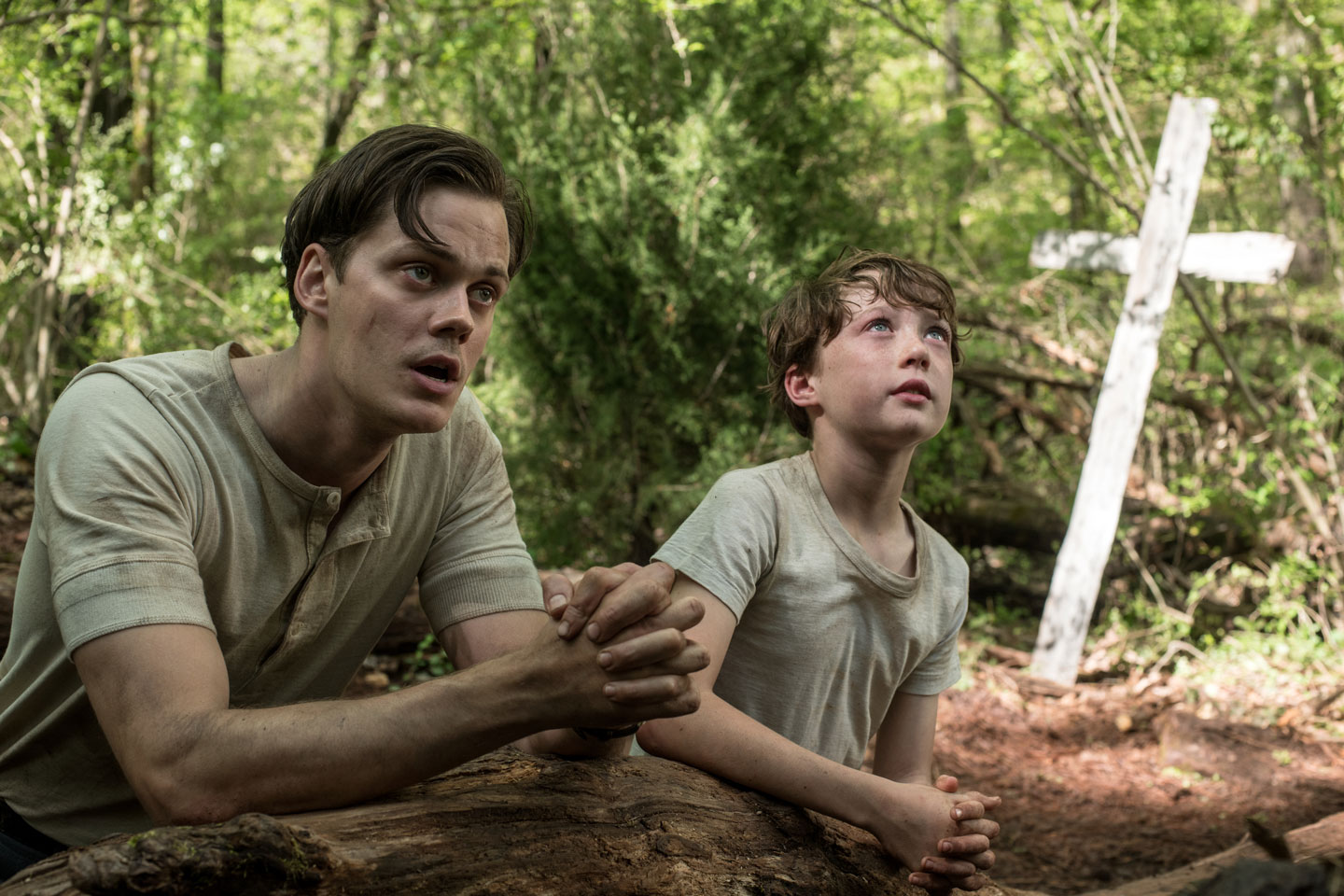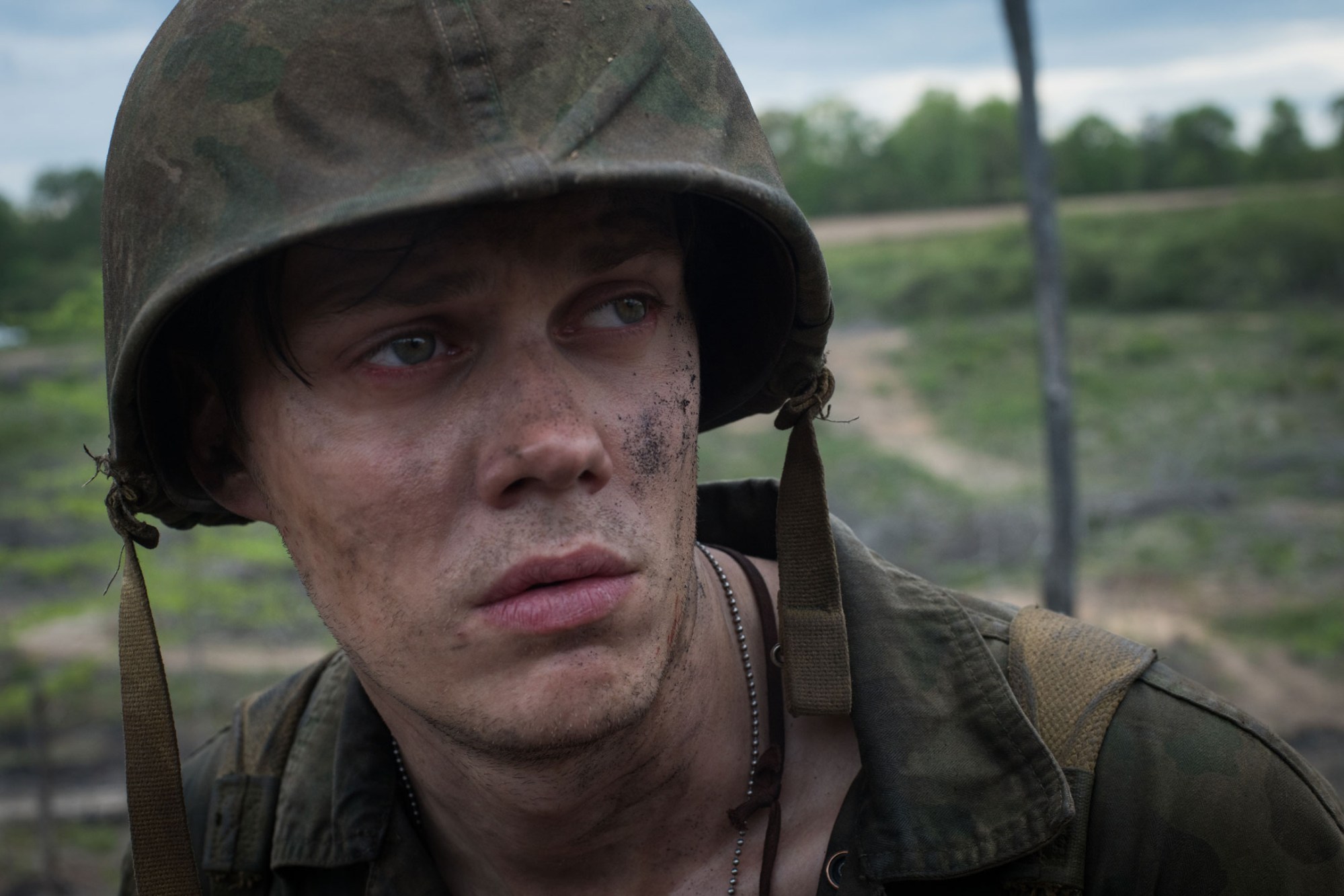It is always strange to see Bill Skarsgård stripped bare of his famous Pennywise clown suit. Beneath the crimson-red hair, jagged teeth, and blood-stained Victorian ruffle collars — a get-up that collectively spooked millions over the course of two It movies, to the tune of a billion dollar-plus box office pull — lies a 30-year-old Scandinavian matinee idol. The star of forthcoming movie The Devil All The Time is a serious actor with alluring good looks, and talent that his illustrious family lineage (his older brother, of course, is actor Alexander Skarsgård; his father the legendary Stellan) has blessed him with.
So when he’s sitting right in front of you, out of costume and on camera, Zooming from his office in Stockholm to discuss his new movie, it’s slightly disarming. For the past six months, Bill Skarsgård hasn’t been an impressive line-up of characters. He’s been himself, patiently waiting to see what might come of the three movies he had lined up to shoot, back to back, throughout 2020.
For a short while, he’s been closer to the family who, you would imagine, spend much of their lives chasing each other from continent to continent; seldom in one place at the same time. “I’m trying to see the silver lining of the world that we are in right now,” he says, his voice low and groaning throughout the duration of our call. “Here I am in Sweden, so the silver lining, obviously, is that we get to spend a lot more time with the people that are closest to us.”

It’s been a long time since Bill last had to talk about his work to a journalist, and the new set-up is still strange to him, but it ties in nicely to the way in which his latest movie is reaching its audience. Absconding a traditional cinema release, partly due to the pandemic, The Devil All The Time will arrive directly onto Netflix worldwide. Still, it feels like the kind of torrid and enthralling story that warrants a big screen viewing.
Set between West Virginia and Southern Ohio in the aftermath of the Vietnam War, the dark American thriller, based on a novel by Donald Ray Pollock, focuses on an array of strangely interlinked characters — the child of a veteran, a paedophilic preacher, serial killer lovers and a schoolgirl, to name a few — as they navigate what seems like a lawless landscape. The cast is gigantic: Robert Pattinson, Mia Wasikowska, Riley Keough, Eliza Scanlen and Sebastian Stan all have key roles.
The story is bound by Arvin Russell, played by Tom Holland. His father, Willard, is the man who shaped him. Tortured by the violent images of his past in the military, the demise of his wife’s health and his unyielding ties to God, it was Bill’s job to get to the root of that character; a job he calls “one of the biggest challenges of my career”. He auditioned for Antonio Campos, the movie’s director, twice before he got the part. In the film, we see Willard spiral, making extreme sacrifices in maniacal states. If the insanity of Pennywise is rooted in fantastical horror — a thrilling type of fear — what you see here is the true mental torture of PTSD, and how even the lure of religion can do nothing to stop it. “How do you protect your family from the unknown, and from the things that we can’t control?” Bill asks, knowing the answer: “That ends up being faith, right?”

The challenge came with the pressure of stilted expression. Willard is stoic; a reserved man who’s been sculpted by the traditional ideals of American masculinity: heroism and hardiness. “You could feel like there was so much going on in his head all the time, even though he didn’t do much,” Bill says. “With him, there was this kind of constant engine of thoughts and worries and anxiety and anger. I wanted that to kind of come out, you know? He’s unlike any character that I’ve ever done before.”
Bill, by contrast, spent his adolescence in what he calls the “most free place you could imagine on the planet”. His home city of Stockholm was an idyll when it came to expressing himself through any form of masculinity. A liberal gift few are afforded. “I mean, men are allowed to cry just from talking about their emotions! Everyone’s allowed to be anything they want here. It’s a very unusual place, obviously, a world where that is accepted.” For too many men though — men like Bill’s character — “[repressed] emotions come with violence or chaos,” he says. “That has and still is a huge problem for men. Maybe it’s not accepted to come to terms with what your feelings are, and to speak freely about them. We all know that bottling things up means that you’re a ticking time bomb.”

It could be argued that that kind of attitude is unique to certain pockets of society, but Bill is in the process of his Scandi-American crossover moment. He spends more time in the States at the moment than he does in Sweden. In the early days of his breakout fame, during an interview with his brother Alexander for Interview Magazine, he spoke of experiencing a sense of comfort and fulfilment when he landed back home. Has America become that new home? It’s complicated, he says. “Growing up outside of America, you’re so in their culture. The first time as an adult that I was hanging out in New York, I was just like, ‘Oh, this is literally like walking around a film set’. It was insane how deeply connected I was to this place that I’d never been to.” That veneer, though, naturally breaks down. “America is like no other place on the planet, and with everything that’s happening with it right now, I mean, it’s heartbreaking.” He is alluding, without naming it, to the wider resurgence of the Black Lives Matter movement — a positive development that’s unfolding in tandem with an election campaign that could have a detrimental impact on those who are demanding long overdue equality.
The strange and isolated America seen in The Devil All The Time is caustic; one in freefall. And though the time setting places it several decades before the world we live in now, there’s a familiar oppressiveness to it. One in which reliable authority feels absent, violence is commonplace, and the toxicity of Christian extremism rings true. America is terrifying — this movie is a testament to that — but its modern history is laced with hope. “It feels like the America that you and I grew up with is no longer,” Bill Skarsgård says, “and it’s changing the world.”
The Devil All The Time is streaming worldwide on Netflix now

